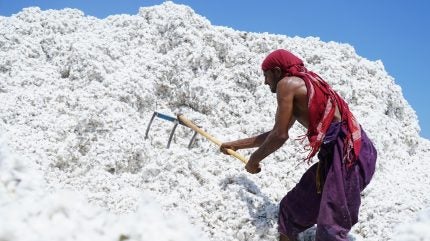
Through Soorty’s partnership in the OCA Seed Commercialization Initiative it is tackling the long-standing challenge of providing access to safe, non-genetically modified organism (GMO) cotton seeds and boosting the traceability of sustainable cotton in Pakistan.
By participating in this project, SOCI can supply farmers with dependable access to superior, non-GMO seeds, marking a significant advancement in the cultivation of organic cotton.
Soorty agriculture ventures and traceability head Dr Yousaf said: “As we embrace project digitalisation, we are revolutionising farmer advisory with modern tools, ensuring traceability through the digital bale passport, and strengthening our initiatives with a dedicated seed laboratory. By launching the new ROC project, we are not just advancing sustainability — we are empowering farmers, enhancing transparency, and shaping the future of responsible agriculture.”
Soorty’s approach to sustainability encompasses a broad spectrum of activities including regenerative and organic farming, recycling advancements, traceability efforts, and ethical manufacturing practices.
The company integrates responsible sourcing, an innovative culture, social impact, and digital transparency to demonstrate that denim production can be conducted in a manner that benefits both the environment and individuals within the supply chain.
Soorty’s additional sustainability endeavours include promoting social uplift and transforming Pakistan’s cotton sector via sustainable practices.
SOCI and the Soorty Regenagri Initiative (SRI) are central to these efforts, providing non-GMO, ethically produced cotton that also rejuvenates the soil. These initiatives offer farmers financial stability, education, and ongoing support while integrating traceability solutions and ensuring fair market access for growers.
Second Life, a trademark brand of recycled cotton products under the Soorty umbrella, enhances Soorty’s commitment to circularity by converting post-consumer and post-industrial waste into new, traceable denim products.
Soorty is also working towards achieving Regenerative Organic certification by year-end. This certification will complement Soorty’s existing organic programmes aimed at enhancing soil health and biodiversity.
Furthermore, the company has initiated a project that will provide brand partners and eventually consumers with visibility into the origins of their cotton. The introduction of QR-coded cotton bales is anticipated by the end of this year, enabling users to verify the source of their cotton and promote accountability within the supply chain.
The newly established Soorty Seed Integrity Lab represents another investment in quality assurance. The lab is equipped to conduct off-season testing in climate-controlled environments, assess fibres purity, verify GMO-free seeds, and measure sustainability metrics to uphold industry standards.
Soorty has also partnered with digital agriculture platform SAWIE to empower farmers by providing them with access to data analytics and artificial intelligence through a digital agricultural platform. A formal agreement was signed on 22 January as part of Soorty’s dedication to enhancing cotton-growing communities in Pakistan.
SAWIE CEO Dr Khalid Mahmood said: “Through SAWIE Trace, we are enabling full transparency from farm to fashion, ensuring that every step of the journey is rooted in sustainability. By integrating regenerative and organic farming systems, we aim to reduce the ecological footprint of cotton, enhance water conservation, improve soil health, lower carbon emissions, and improve farmer incomes. This partnership marks a significant step towards a more responsible and climate-smart textile industry.”
Soorty is implementing initiatives that strengthen women’s roles in farming communities and digitising financial transactions to increase transparency and efficiency for all stakeholders involved.



